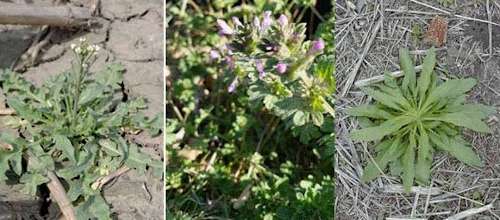By Sarah Lancaster
Recent drops in temperature have prompted concerns about the effectiveness of herbicide applications made during cold weather. The general recommendation for this situation is to wait for warmer weather to make herbicide applications. There are a couple of key factors that lead to this recommendation.
Herbicides are most effective when plants are actively growing. This is especially important for systemic herbicides such as glyphosate and 2,4-D. There is a theory that contact herbicides, such as paraquat (Gramoxone), may be less effected by cold temperatures because they do not have to be translocated throughout the plant to be effective. In general, weeds grow best with temperatures greater than 60°F.

Figure 1. Weeds commonly found in fields during early spring, such as shepardspurse (left), henbit (center) and marestail (right) grow best in temperatures greater than 60°F, which means herbicide activity on these weeds will be reduced in colder weather.
Crops are more susceptible to herbicide injury in adverse growing conditions. When applying pre-emergence herbicides to corn, be aware that corn stressed by cold soil will not metabolize herbicides well. Herbicide applications of Group 15 (acetamide) herbicides such as S-metolachlor may result in crop injury during extended periods with cold, wet soil conditions.
Another factor to consider is that sprayers that are not drained and/or protected from cold temperatures can be damaged if water freezes in the system. This could lead to damage the sprayer equipment (valves, pumps, etc.) that results in lost time and/or costly repairs.
Even though pressures to complete field work are extreme this time of year, the best plan for maximum herbicide effectiveness is to wait. Warmer temperatures are forecast in the near future. If waiting is not possible, consider increasing herbicide rates to the maximum allowed by the label and utilize adjuvants that might be optional under normal temperature conditions.